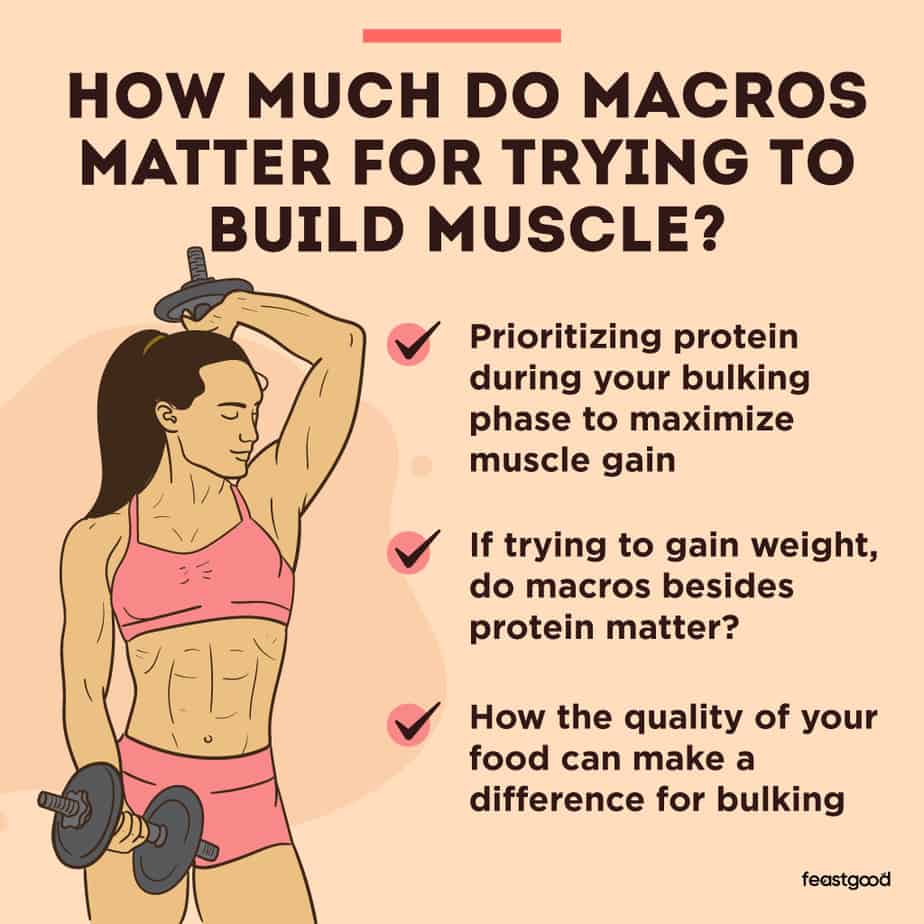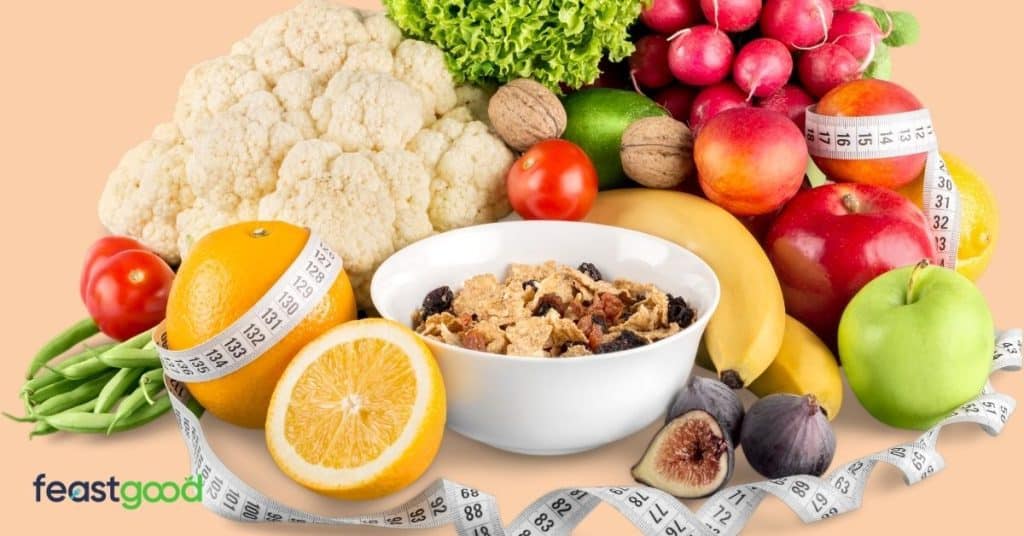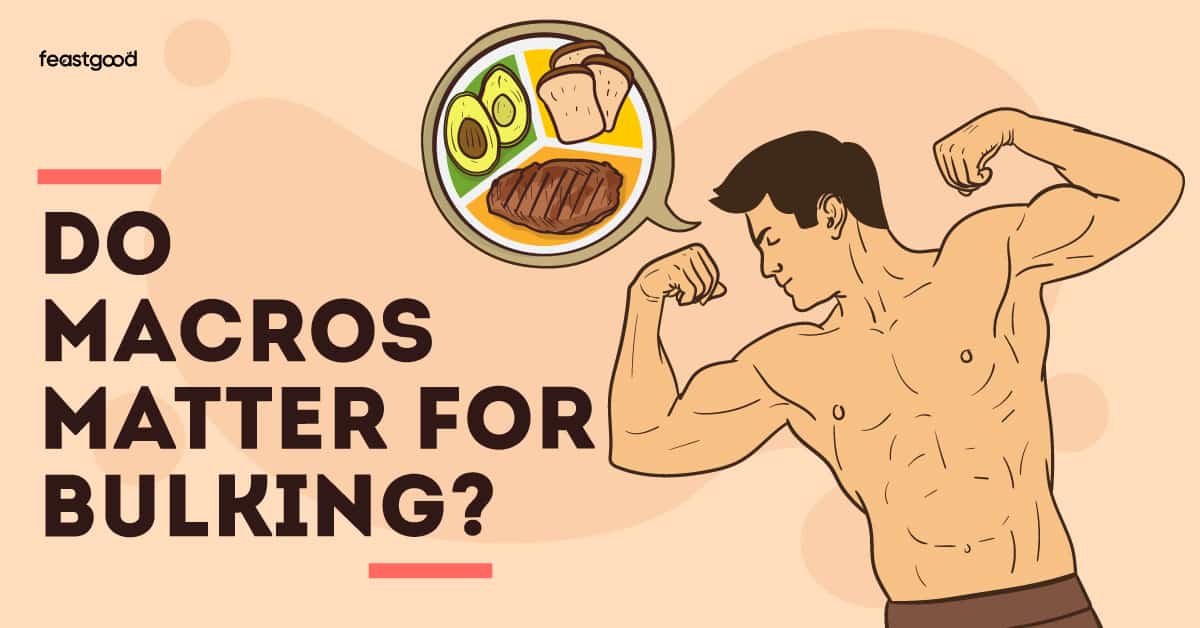When you are bulking, the most important factor is that you are eating in a caloric surplus. This can be accomplished by increasing the amount of food that you are eating.
Once you are in a surplus though, the question becomes whether the macro profile of the foods you are eating will have an impact on your results.
So, do macros matter for bulking? Yes, your macros matter when it comes to bulking. While the total amount of calories that you consume will determine whether or not you gain weight during a bulk, it is the ratio of your macros that will determine what type of weight you gain (muscle or fat) and how quickly it will happen.
Although the main principle of a bulking phase is to eat in a calorie surplus, it is important to remember that processed foods and “junk foods” should never make up the majority of your diet, and you should still aim to get the majority of your calories from whole, nutrient-dense food sources.
In this article, you will learn:
- Energy balance: How this impacts bulking results
- How much do macros matter for trying to build muscle?
- What is the best macro split for bulking?
- How do you increase your macros for bulking over time?
- Do you need to track macros if you want to gain weight?
Check out our complete guide on How To Track Your Macros.
Energy Balance: How This Impacts Bulking Results
The success of your bulking phase is directly correlated with maintaining a positive energy balance over a consistent period of time.
In order to create a positive energy balance, you must ensure that you are taking in more calories than you are burning.
While a calorie surplus is necessary for a bulking phase, it is important to note that more is not always better, and studies show that consuming only an extra 10-20% of your maintenance calories will result in a weight increase of around 0.25-0.5% of your current body weight per week.
For example, if a 200-pound male normally consumes around 2700 calories per day to maintain his weight, then he would only need to consume an extra 270-540 calories per day in order to see a weight gain of 0.5-1 pound per week.
While you can most certainly increase your caloric surplus in order to see a faster rate of weight gain, you might also see an increase of unnecessary fat gain in addition to an increase in muscle mass.
If your goal during your bulk is to increase weight from added muscle, while keeping fat gain as minimal as possible (lean bulking), then it is best to stick to a more conservative calorie surplus such as the one highlighted in the example above.
On the other hand, if your goal in your bulking phase is to put on muscle mass, and you have no concern for the amount of fat that you gain in the process, then you can increase your calorie intake beyond the recommended 10-20% of your maintenance calories.
- Related Article: Can You Build Muscle With A Bad Diet?
How Much Do Macros Matter for Trying to Build Muscle?

When you are trying to build muscle in a bulking phase, the most important thing is to make sure that you are in a calorie surplus. With that said, your macro ratio can certainly have a large impact on how successfully you build muscle during your bulk.
In this section I will discuss:
- Prioritizing protein during your bulking phase to maximize muscle gain
- If trying to gain weight, do macros besides protein matter?
- How the quality of your food can make a difference for bulking
Prioritizing Protein During your Bulking Phase to Maximize Muscle Gain
When the primary goal in a bulking phase is to put on muscle, you will want to ensure that you are eating a proper balance of macros in order to maximize your body’s ability to build lean muscle mass. More specifically, you will want to ensure that you are paying attention to your protein intake, as protein is essential for building muscle tissue.
While your ideal protein intake may also depend on your overall calorie intake, in general, it is recommended to consume around 0.54-0.9 grams of protein per pound of body weight.
This recommendation can increase slightly to about 1-1.5 grams of protein per pound of body weight if you are an active individual who is in a caloric surplus with the goal of putting on muscle.
Further on in the article, I discuss what percentage of your total calories should be coming from protein in order to optimize your bulking phase.
- Related Article: How To Know If You Are In A Calorie Surplus
If Trying to Gain Weight, Do Macros Besides Protein Matter?
While you want to make sure that you are prioritizing protein during a bulking phase, you also don’t want to neglect the importance of consuming enough carbohydrates and fat. All three macronutrients are important and will serve a purpose in your bulking phase.
Since we have already outlined the importance of protein, below I discuss how carbs and fat can affect your bulking phase:
Carbohydrates
Carbohydrates are the fuel that your body will utilize during workouts in order to build muscle. Eating plenty of carbs during your bulk will help to ensure that you are not breaking down any muscle for energy.
In addition to this, eating more carbs causes the body to produce more insulin, which can help to transport the calories that we are eating toward muscle growth.
While carbs are a very important and essential part of your bulking phase, it is important that you are consuming carbs mostly from quality whole food sources, rather than from processed foods that are full of simple sugars.
Eating foods that are high in carbohydrates but also accompanied by fiber will help to ensure that you do not experience a dramatic spike in your blood sugar, which can lead to negative effects over time. Making sure that you eat carbs in conjunction with protein and fat can also help to stabilize your blood sugar.
Fat
Fat is also important to include in your bulking diet, as it is considered an essential nutrient that is critical for proper hormone function in the body. It is important not to neglect essential fatty acids such as Omega 3 fatty acids, even while on a bulk.
Consuming dietary fat is a great way to pack in extra calories during your bulking phase if you struggle to hit your targets, as fat contains 9 calories per gram, while carbs and protein only contain 4 calories per gram.
While dietary fat has an important place in a calorie surplus, you want to ensure that you are consuming good quality fats such as unsaturated fats (such as olive oil, nuts, fish), moderate quantities of saturated fats (red meat, butter, cheese) and avoiding trans fats (found mostly in processed foods) altogether.
One last thing to remember is that the overconsumption of fat, especially during a bulking phase, will more than likely lead to excess fat gain. Since high-fat foods are much more calorie-dense per gram, it is much easier to overdo fat intake.
Further on in the article I discuss what percentage of your calories should be coming from fat during your bulk.
- Related Article: Should You Weigh Food Raw or Cooked When Tracking Macros?
How The Quality of Your Food Can Make a Difference for Bulking
Not only is it important to balance your macronutrients during a bulking phase (discussed in more detail in the next section), but it is also very important to pay attention to the types of foods that you are eating.
It can be tempting during a bulking phase to eat foods that are very calorie-dense but are lacking in nutrients. While there is most definitely room for some processed foods in your bulking diet, you want to make sure that is not where the majority of your calories are coming from.
If you choose to consume the majority of your calories from processed foods that are full of unhealthy fats and processed sugars, you risk not getting enough micronutrients that are found in whole foods which are essential for your overall health.
In addition to this, high-calorie processed foods that are low in micronutrients are most often low in dietary fiber as well. When your diet is lacking in fiber, you run the risk of experiencing digestive issues that can have a large impact on your training sessions.
- Related Article: How To Gain Weight Without Eating Sugar (Sample Meal Plan)
What Is the Best Macro Split for Bulking?

The best macro split for your bulking phase may not vary a lot from your maintenance phase if you are already consuming a well-balanced diet.
According to bodybuilding researchers, an ideal macro split for a bulking phase is roughly:
- 40-60% of calories from carbohydrates
- 30-35% of calories from protein
- 15-30% of calories from fat
While the ratio of carbs and fats in your diet may vary depending on the individual, if your main goal is to put on lean muscle mass during your bulking phase, you should aim to keep your protein intake consistent at roughly 30-35% of your daily calorie intake.
For example, if the 200-pound man mentioned above were to increase his intake by 300 calories for a total surplus of 3000 calories per day, then he would need to eat roughly 300-450 grams of carbs, 225-263 grams of protein, and 50-100 grams of fat in order to stay within the ideal macronutrient range.
- Related Article: 50-30-20 Macros: What Is It, How It Works, & Sample Meals
How Do You Increase Your Macros for Bulking Over Time?
When you are in a bulking phase and your goal is to increase your weight, it is important to remember that you will more than likely need to adjust your bulking macros as time passes and as your weight increases.
As your weight increases, your Total Daily Energy Expenditure (TDEE) also increases. As a result, the number of calories that you will need in order to maintain your weight will go up, which ultimately means that your bulking calories will increase as well.
For example, if the 200 pound man in the above example gains 15 pounds in his bulking phase, his maintenance calories will increase by around 100 calories, putting him at around 2800 calories.
Therefore, if this individual were to stick to the same calorie increase of 300 calories, his new bulking macros would be about 3100 calories.
It must be kept in mind that as your weight fluctuates, the number of calories that your body needs to maintain your weight will fluctuate as well.
If one of your goals during your bulking phase is to reverse diet in order to increase the number of calories that you can eat, this can be done by strategically increasing your calories by roughly 50-100 calories a week for about 4-10 weeks.
Do You Need to Track Your Macros If You Want to Gain Weight?

If your desire is to gain weight, you do not necessarily need to count your macros in order to be successful.
The most important factor in a bulking phase to gain weight is to ensure that you are in a caloric surplus. While you can optimize your bulking phase by balancing your macros, it is not mandatory that you do so in order to see weight gain.
If you are looking for more guidance as to what the proper bulking calories and macros are for you and your specific goals, it is highly recommended that you seek out the advice of a coach who can design a personalized program for you. Click here to book a 20-minute free consult call with one of our coaches!
Other Bulking Resources
- Is It Better To Hit Your Macros or Calories? What’s Best
- Gaining Muscle Without Counting Calories or Macros (7 Tips)
- Struggling To Eat Enough Calories? 15 Tips That Actually Work
- How Long Should You Bulk? 3 Factors To Consider
- Building Muscle Without Supplements: Is It Possible?
- Can You Get Abs While Bulking?
References
Lambert CP, Frank LL, Evans WJ. Macronutrient considerations for the sport of bodybuilding. Sports Med. 2004;34(5):317-27. doi: 10.2165/00007256-200434050-00004. PMID: 15107010.
Carbone, J. W., & Pasiakos, S. M. (2019). Dietary Protein and Muscle Mass: Translating Science to Application and Health Benefit. Nutrients, 11(5), 1136. https://doi.org/10.3390/nu11051136
American Dietetic Association; Dietitians of Canada; American College of Sports Medicine; Rodriguez NR, Di Marco NM, Langley S. American College of Sports Medicine position stand. Nutrition and athletic performance. Med Sci Sports Exerc. 2009 Mar;41(3):709-31. doi: 10.1249/MSS.0b013e31890eb86. PMID: 19225360.
Phillips, L. S., Goldstein, S., & Gavin III, J. R. (1988). Nutrition and somatomedin XVI: Somatomedins and somatomedin inhibitors in fasted and refed rats. https://doi.org/10.1016/0026-0495(88)90097-2
Nemeth M, Eisenschenk I, Engelmann A, Esser FM, Kokodynska M, Szewczak VF, Barnreiter E, Wallner B, Millesi E. Flaxseed oil as omega-3 polyunsaturated fatty acid source modulates cortisol concentrations and social dominance in male and female guinea pigs. Horm Behav. 2021 Aug;134:105025. doi: 10.1016/j.yhbeh.2021.105025. Epub 2021 Jul 7. PMID: 34242874.
Trexler, E. T., Smith-Ryan, A. E., & Norton, L. E. (2014). Metabolic adaptation to weight loss: implications for the athlete. Journal of the International Society of Sports Nutrition, 11(1), 7. https://doi.org/10.1186/1550-2783-11-7
About The Author

Colby Roy is a holistic health and nutrition coach. She is certified through Precision Nutrition and has a passion for all things nutrition and healing the body. More specifically, Colby likes to work with clients who want to optimize their gut health and energy levels.
Why Trust Our Content

On Staff at FeastGood.com, we have Registered Dietitians, coaches with PhDs in Human Nutrition, and internationally ranked athletes who contribute to our editorial process. This includes research, writing, editing, fact-checking, and product testing/reviews. At a bare minimum, all authors must be certified nutrition coaches by either the National Academy of Sports Medicine, International Sport Sciences Association, or Precision Nutrition. Learn more about our team here.
Have a Question?
If you have any questions or feedback about what you’ve read, you can reach out to us at [email protected]. We respond to every email within 1 business day.

